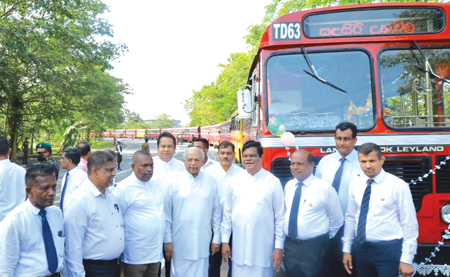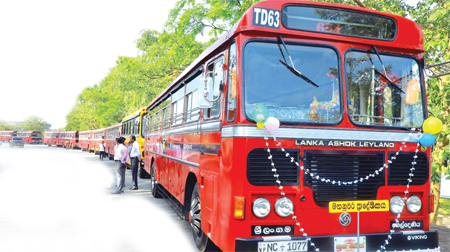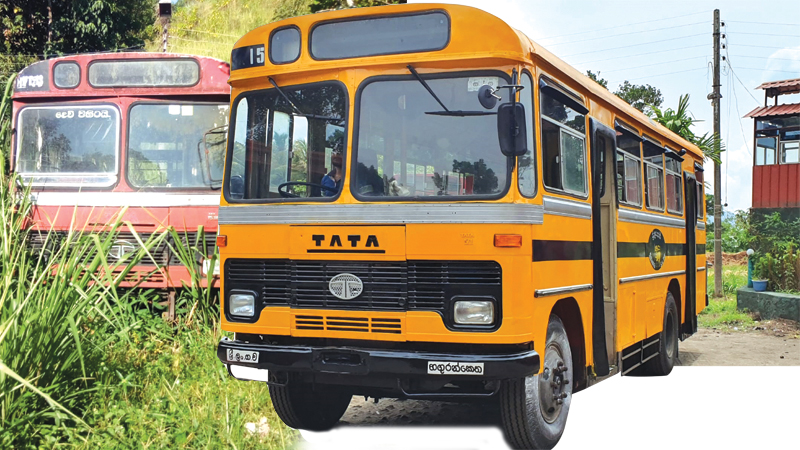Some time ago rumours began to circulate suggesting that the Sri Lanka Transport Board (SLTB), the State-owned passenger bus operator, is on the verge of collapse. The condition of the SLTB had degraded to such an extent that private buses had expanded their influence significantly. However, today, the situation has undergone a complete transformation.
The SLTB fleet of buses has steadily grown, enhancing public service without relying solely on importing new buses and instead by leveraging local technology with only essential spare parts imported. Consequently, the SLTB bus fleet has experienced improvements across various fronts.
As part of its initiatives, the SLTB brought back buses that were previously sidelined due to various defects, including those used for the Commonwealth Heads of State and Government Meeting (CHOGM) in 2014. Through this the SLTB managed to generate a substantial daily income by resuming passenger transport services on expressways with these Chinese-made luxury buses.

Prime Minister Dinesh Gunawardene and Minister of Transport,
Highways and Media, Dr. Bandula Gunawardena inspect the
reconditioned buses before the launch.
Additionally, a special effort was made to refurbish buses that had been withdrawn from service due to a lack of spare parts especially during the Covid period. This restoration process occurred in two stages.
The initiative took place under the guidance of the Minister of Transport, Highways, and Mass Media, Dr. Bandula Gunawardena, and with the mentorship of SLTB Chairman Lalith De Alwis, as well as the leadership of SLTB Chief Mechanical Engineer (Production) R.P. Lakshman Pushpakumara.
In the past, buses with similar issues were typically left to languish in depots and eventually auctioned off under the pretext that all non-operational buses should be sold. However, this time, middle-ranking officials could not engage in such dubious practices. Instead, thorough investigations were conducted into the defects of the buses, the reasons for their removal from service, their production year, mileage, repairs for re-entry into service, and various other factors. Some of the defects were found to be minor.
After a thorough investigation, it was discovered that numerous buses previously withdrawn from service could be fully restored and therefore underwent comprehensive renovations.
Accordingly, the first phase commenced in March 2023, focusing on the renovation of 200 buses. During this stage, the SLTB completed the work in less than five months and renovated 193 out of the 200 buses, bolstering the countrywide SLTB fleet with an additional 193 buses.
A total of Rs. 197 million was allocated for the first phase of this comprehensive bus renovation project. Consequently, on average, the expenditure for each bus was close to Rs. 1 million.
If even a normal bus were to be newly imported from India, it would necessitate an expenditure of over Rs. 21 million per bus. Additionally, this would result in our funds being transferred abroad, with unemployment rates remaining unchanged and the country’s resources left under-utilised.
In the second phase, which commenced in August last year, 248 buses underwent renovation at a cost of Rs. 270 million. Out of these 248 buses, 201 have been completely renovated and recently put into operation at an event held under the auspices of Prime Minister Dinesh Gunawardena.
Roundtrips
As a result, now each bus has the potential to generate a daily income of Rs. 30,000. With the renovated buses now operational, SLTB stands to earn a substantial amount of revenue. Assuming each bus operates at least six times a day (round trips) with an average of 50 passengers per trip, considering the combined fleet of 394 buses, a total of 118,200 passengers can be transported per day.
For several years, we were deprived of this passenger service due to the absence of maintenance or renovation of buses suitable for immediate operation.

A fully reconditioned bus
The bus restoration efforts were carried out across 12 SLTB depots located throughout the island. Both Leyland and Tata buses, as well as single-door smaller buses utilised in hilly and rural areas, underwent comprehensive renovation as part of this novel initiative.
As of January 2023, 852 buses had been withdrawn from service at SLTB depots. Engineers and technicians at 107 SLTB depots and 12 regional workstations across the island commenced the rehabilitation process for these buses under this project.
If each bus operates for 300 days out of the 365 days in a year, the potential annual income through these 394 buses would be at least Rs. 3.5 billion. If these buses are utilised for long-distance services and the number of operating days per year is increased to 325, the earnings are likely to surpass Rs. 4 billion.
Approximately 200 new buses could be purchased from India with these funds. Alternatively, if half of the funds are allocated to other expenses, including bus maintenance, at least 100 new buses, including possibly electric low-floor buses, could still be procured.
This previously undisclosed possibility remained hidden due to various factors. In the recent past, certain depot managers took advantage of the situation for personal gain. Specifically, depot bosses such as those in Ampara (who affixed a registration plate of a non-working bus to a working bus and brought it to an event) were implicated in corrupt practices and fraud. While only a few cases have been exposed thus far, more instances may exist. Throughout, newspapers have highlighted instances where SLTB bus ticket inspectors, conductors, and timekeepers have been exploiting passengers.
In fact, the SLTB could be losing as much as Rs.10 million per day due to such corrupt practices. However, the lack of investigation into these matters has been a significant hindrance.
A notable revelation during the deployment of buses in the second phase was that by exclusively utilising the 200 refurbished buses for daily operations, the SLTB could potentially generate a daily income of around Rs. 10 million. With a net profit of Rs. 4 million, operating these 200 buses alone could result in an annual net profit of Rs. 1.2 billion.
Out of the 248 buses slated for repair in the second phase, the remaining 47 buses, along with those fully renovated by March 31 of this year, have now been put into operation.
These buses were sent for complete restoration to the SLTB regional workshops in Uva, Nuwara Eliya, Kandy, North West, Colombo, Gampaha, Sabaragamuwa, Kalutara, Ruhuna, Rajarata, the North, and the East. One bus underwent repairs under phase 1, and another under phase 2 at the Colombo Central Bus Depot. The Sisu Seriya (school transport) buses underwent comprehensive repairs as well, as part of the same project.
This program has saved a vast amount of foreign exchange for the country and helped to boost the SLTB fleet to give the private bus operators a good run for their money.
Translated by Maneshka Borham









